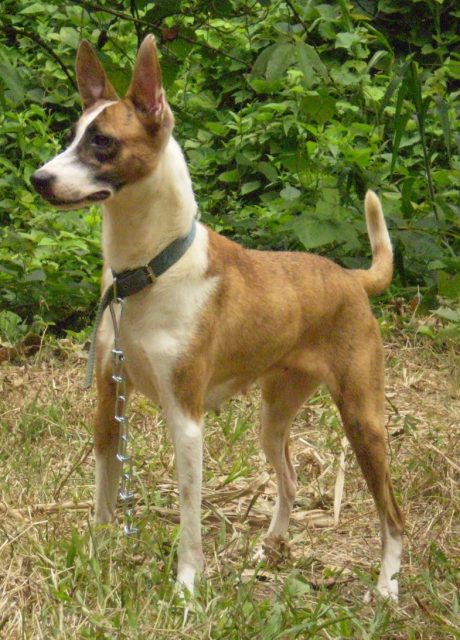| Other Names |
American Dingo, Carolina Dingo, American Pariah, Dixie Dingo, North American Native Dog, Indian's Dog |
| Nicknames |
Ol' Yaller. Yeller Dog, Yellow Dog |
| Country of Origin |
United States |
| Weight |
30 - 44 lbs. (15 - 20 kg) |
| Height (at withers) |
17 - 24 in. (45 - 61 cm) |
| Coat |
The skin is tight and the coat is short but thick with a dense undercoat in season; there is a profusion of longer guard hairs on the neck, withers and back that may be erect when the dog is aroused. |
| Colour |
The preferred colour is deep red ginger with pale buff markings over the shoulders and along the muzzle. Variations in colour, grading from straw coloured through wheaten to pale yellow or buff are also acceptable, but never all white. |
| Litter Size |
7-13 puppies, Average around 8 |
| Life Span |
12-14 years |
| Origin & History |
Carolina Dogs were Indian dogs and were the first domesticated dog of the Americas. The Carolina Dog comes out of the American Deep South and is thought to be a direct descendant of the ancient pariah dogs that accompanied Asians across the Bering Strait land bridge 8,000 years ago. A number of such pariah types exist in the USA. The Carolina Dog was discovered and named by Dr. I. Lehr Brisbin, Jr., a biology professor at the University of Georgia, at the United States Department of Energy's Savannah River site in South Carolina. This is a remote area from which the public has been excluded, and wild dogs that have lived there for centuries have had little opportunity to breed with domestic dogs. Brisbin noted that these dogs were almost identical in looks to the Dingo. Other scientists observed that the Carolina's bone structure was very similar to the remains of the neolithic dog bones from Native American burial sites thousands of years old. Ecologists in the South, including Dr. I. Lehr Brisbin, Jr., are searching for pure specimens still in the wild swamps and piney woods of the Savannah River basin. Pups are occasionally placed with selected families to be raised and trained as companions and hunters of small game. Brisbin hopes that by researching the Carolina Dog, today's dogs can be better understood. Many of these dogs were favored by Indians and used for various tasks such as herding. The Kentucky Shell Heap Dog and the Basketmaker Dog are examples of ancient pariahs on the North American continent. Down South, the Carolina Dog is affectionately named "Old Yaller" because of his yellow color. |
| Personality |
The Carolina Dog is a pariah dog. ("Pariah dog" is a general name in India for the half-reclaimed dogs that swarm in every village, owned by no one in particular, but ready to accompany any individual on a hunting expedition.) The Carolina Dog is one of the very few breeds existing today that is truly a primitive dog, a result of natural selection for survival in nature, and not of selective breeding. Wild specimens are still known, so this is not a completely domesticated canine. This dog that has survived as a free living animal in the swamps, savannahs, and forests of South Carolina and Georgia for thousands of years has also proven to be highly adaptable and amenable to domestication, and an excellent pet. Many dogs are known to be extremely shy around people and dislike a lot of handling unless socialized at a very young age. With proper socialization, they are proven to be loyal companion dogs. Many of the characteristics of the natural dog that are predominant in the Carolina Dog contribute to his ability to adjust well to being a loving pet. The Carolina Dog enjoys and needs to be part of a pack, and thus integrates very well into the family framework. He is a gentle, social dog, and bonds very well with children, enjoying play and activities with them. The Carolina Dog is very clean by nature and is easy to housebreak. He is intelligent and responsive and learns easily and is not destructive. Not aggressive by nature but with a well-developed hunting instinct, the Carolina Dog will get along with other animals if introduced to them at a young age. Like the other types of pariah dog, the Carolina Dog is quite independent. If you are to keep one of these dogs as a family pet, one needs to achieve pack leader status. It is a natural instinct for a dog to have an order in their pack. When we humans live with dogs, we become their pack. The entire pack cooperates under a single leader. Lines are clearly defined and rules are set. Because a dog communicates his displeasure with growling and eventually biting, all other humans MUST be higher up in the order than the dog. The humans must be the ones making the decisions, not the dogs. That is the only way your relationship with your dog can be a complete success. He is suspicious and may be somewhat shy to strangers and in unfamiliar surroundings or circumstances. This is not a dog that is outgoing and friendly to everyone, but rather is devoted to his own “pack.” They enjoy hunting small game, a task they do with grace and quickness. The Carolina Dog could almost pass for a larger size Dingo. Like the Dingos and pariahs before them, they have strong herding instincts. Carolina Dogs have a tendency to howl at certain noises. |




